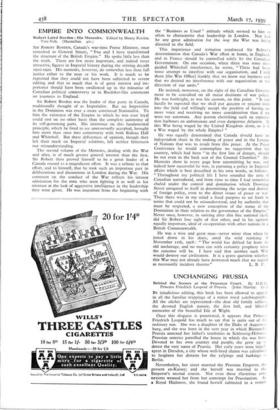EMPIRE INTO COMMONWEALTH
SIR ROBERT BORDEN, Canada's war-time Prime Minister, once remarked to General Smuts, "You and I have transformed the structure of the British Empire." He spoke little less than the truth. There are few more important, and indeed more attractive, figures in Imperial history during the stirring decade 1910-1920. His memoirs, however, do somewhat less than full justice either to the man or his work. It is much to be regretted that they could not have been subjected to severe editing and that so much that is of great interest and im- portance should have been swallowed up in the minutiae of Canadian political controversy or in Baedeker-like comments on journeys to England.
Sir Robert Borden was the leader of that party in Canada, traditionally thought of as Imperialist. But no Imperialist in the Dominion was ever a more convinced Nationalist. To him the existence of the Empire to which he was ever loyal could rest on no other basis than the complete autonomy of its self-governing parts. His insistence on this fundamental principle, which he lived to see unreservedly accepted, brought him more than once into controversy with both Rideau Hall and Whitehall. But these differences of opinion, though they left their mark on Imperial relations, left neither bitterness nor misunderstanding. The second volume of the Memoirs, dealing with the War and after, is of much greater general interest than the first. Sir Robert then proved himself to be a great leader of a Canada roused to a magnificent effort. It was a tribute to that effort, and to himself, that he took such an important part in deliberations and discussions in London during the War. His comment on the conduct of the War reflects his intense admiration for the men who were fighting it as well as his mistrust at the lack of aggressive intelligence in the leadership they were given. He was impatient from the beginning with the " Business as Usual " attitude which seemed to him so often to characterise that leadership in London. Nor had he any great admiration for the way the War was being directed in the field.
This impatience and irritation reinforced Sir Robert's determination that Canada's War effort at home, in England, and in France should be controlled solely by the Canadian
Government. On one occasion, when there was some mis- guided Whitehall interference, he wrote, " There had been some attempt to interfere with our organisation, and I told them [the War Office] frankly that we knew our business and that we desired no interference with our organisation or the direction of our units."
He insisted, moreover, on the right of the Canadian Govern- ment to be consulted on all major decisions of war policy. He was forthright, as was his custom, on this point. " It can hardly be expected that we shall put 400,000 or 500,000 men into the field and willingly accept the position of having no more voice and receiving no more consideration than if we were toy automata. Any person cherishing such an expecta- tion harbours an unfortunate and even dangerous delusion. Is this War being waged by the United Kingdom alone, or is it a War waged by the whole Empire? " He was equally determined that Canada should have an independent share in the making of peace and in the League of Nations that was to result from this peace. At the Peace Conference he would contemplate no suggestion that his country, which had been " in the first line of danger, should be not even in the back seat of the Council Chamber." His Memoirs show in every page how unremitting he was, and indeed how successful he was, in pursuing a policy in Imperial affairs which is best .described in his own words, as follows " Throughout my political life I have sounded the note of Canadian nationhood, and from time to time I had somewhat chafed under the control and domination which Downing Street arrogated to itself in determining the scope and destiny of foreign policy, even to the direct issues of peace or war. Thus there was in my mind a fixed purpose to set forth in terms that could not be misunderstood, and by authority that must be respected, a new conception of the status of the Dominions in their relation to the governance of the Empire." Never once, however, in striving after this fine national ideal, did Sir Robert lose sight of that other, and in his opinion equally important, ideal of co-operation with other nations in a British Commonwealth.
He was a wise and great man—never wiser than when he jotted down in his diary, amid the wild rejoicing of November nth, 1918: "The world has drifted far from its old anchorage, and no man can with certainty prophesy what the outcome will be. I have said that another such War would destroy our civilisation. It is a grave question whether this War may not already have destroyed much that we regard










































 Previous page
Previous page